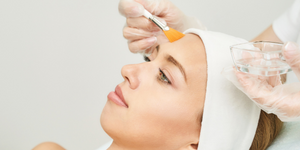Myths about chemical peels
When people mention “chemical peels” many think about the scene from Sex in the city, where Samantha got a chemical peel and had to wear a veil to a party to hide her face. The myth is that you have to hide out when you have a treatment like that. Not all peels are that intense or have down time.
Chemical peels can be as light as an enzyme and just exfoliate the top layer leaving your skin bright and glowing. Usually from light chemical peels you don’t see any peeling or flaking. There are so many wonderful formulas on the market that give excellent results without any down time. A experienced aesthetician can pick the right peel for you.
Myth: Peels leave the skin red, irritated and peeling for a week after the treatment.
With so many formulas on the market when the right one is selected for your skin type your skin will look amazing. A experienced aesthetician can select a formula that is not irritating for your skin. Aestheticians usually will do a lighter peel on your first appointment. It is always recommended to start light while they get to know your skin. This way they know what ingredients work well on your skin. This is also great to get acquainted to how peels work.
Myth: Peels are too aggressive for skin with redness or rosacea.
Many believe you cannot do any type of peels on skin with redness or rosacea. There are some formulas that cannot be used. Typically the lighter and less aggressive acids work well to diffuse the redness on the skin. Some of these formulas contain ingredients that are anti-inflammatory agents.
Myth: Peels thin the skin over time.
I feel like peels give your skin a little work out and make things work better. Peels help to stimulate the formation of collagen, elastin and Hyaluronic acid which makes the skin thicker over time. Peels thin out the layer of dead skin cells making the dull skin look bright and radiant.
Myth: Do not use peels on darker skin types.
You can do peels on darker skin types your aesthetician will just select the right formula that works for that skin tone. This myth started from issues people had with the extremely deep peels that inflamed the skin. Superficial peels do not cause this type of inflammation or complications. Darker skin types are usually treated like a sensitive skin type.
Myth: If I keep on peeling I will damage to the pigment.
Superficial peels will not damage pigment cells because they are in the deeper layers of the skin. Superficial peels are exactly what it sounds like “superficial”.
When you are ready to have a chemical peel for the first time, make an appointment for a consultation. You and your aesthetician can talk about what your desired results are and see which type of peel will get you there. I always feel that when the client knows exactly what is expected and goes home with the right post home care the peel will be a success.
Have more questions about chemical peels. Contact us by revatamedspa@gmail.com or call us at 972-707-8128.





